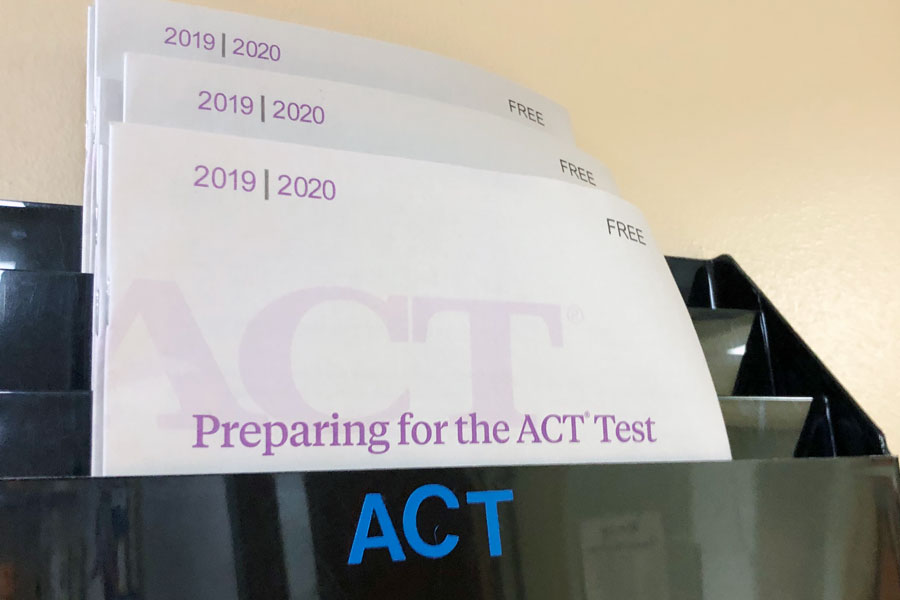Significant changes to ACT are on the way
Students will have options of retaking specific sections
ACT information is available in the counseling center.
Major changes are coming for ACT test takers in 2020. Students will be able to retake specific sections of the ACT next year rather than having to sit for the entire exam.
The student will of course first have to take the full ACT at least once before they can pay to retake any single section.
The ACT is one of two national tests, along with the SAT, that is widely accepted by colleges during the application process, even though fewer colleges are requiring either. Colleges previously have accepted only a composite score of either the SAT or ACT, but over the years schools have moved to using super scores, or taking the best scores from each section from each time the student takes the test. This is supposed to allow students to receive the best score possible and colleges then will see only their best scores from each section rather than the composite score.
College counselor Ms. Kathy Pivonka said she believes this change made by the ACT will be beneficial for students who may have test anxiety or a diagnosed learning disability and qualify for extended time but do not receive the benefit of testing over multiple days. This testing change would give students the chance to go back and take the single test that they may have not done so well on.
Pivonka added that she thinks the colleges that super score will see an increase in ACT scores due to this testing change. “If you had the chance to go just take the math and not worry about the other sections and whether you tried hard enough or not, it could be a real good strategy for a lot of kids,” she said.
Although Pivonka is not sure about the future of the ACT based on this change, she believes that it has the opportunity to increase in popularity. The test, she says, is already widely taken throughout the country, but the single section testing may be attractive to many students as they apply to colleges.
USA Today published an article warning about the rise in popularity, however, of the test due to this change. “Still, some say the advent of one-subject testing and ‘super scores’ could benefit the wealthy and add unnecessary stress to a culture already hyper-focused on test scores,” they wrote.
Some experts expressed concern that those who have the ability to pay to take multiple tests will do so, while those unable to pay will just take the full standard test and their scores will not see the benefit that the wealthy are seeing.
Another upgrade that ACT has made in terms of testing is allowing students to take the test online rather than on paper. Pivonka said that students will have to go to a specified testing location, but she suggests that it will be an interesting process because there will need to be a large amount of computers provided for all of the students willing to test. An upside that she added was that students will be able to receive their scores faster because the test is on the computer. ACT advertizes, “New option to test online with faster results in as soon as two (business) days.”
Pivonka proposes that ACT is making all of these new changes to keep up with a modernizing world. “(ACT) used to tell schools not to super score. That’s why for years Notre Dame did not super score. It was the recommendation based on the make-up of the test that it was not designed to be a super scored test. At the same time they announced (the testing change), they announced that they are encouraging colleges to super score. I think they want to remain relevant, and they want to remain on the cutting-edge.”
She says that both the SAT and ACT are non-profit organizations, but they still tend to compete with each other, which may be another reason for the testing change. Pivonka is unsure whether the SAT will change their testing policies in an effort to keep up with the ACT, but she thinks it is likely SAT will counter with a new test change.
Pivonka noted that she is glad that the ACT made this change because she believes it will take some stress away from students who she says are already overwhelmed by the college process. “If you have that one score that’s a little out of whack, you can go back and take that (single test) and not worry about retaking the whole test,” she said.
Pivonka’s biggest concern with the whole college process at this point is the amount of stress placed on students to go through the whole application and worry about getting into college. “I think that’s my biggest job, helping to manage the stress and making sure you guys are on (an) even keel and actually make (applying to college) a little bit fun, as fun as it can be.”
Taking Pivonka’s advice, remember that the college process, as stressful as it is, is supposed to be, if not enjoyable, at least valuable. If you are testing this coming year, make sure to sign up early on the ACT website and don’t forget to take a look at the make-up of the test before you head into the exam.

Nic Napier is a senior and the Co-Editor-In-Chief of the Megaphone this year. Along with newspaper, Nic is involved in several activities and clubs on...

Gracie Carr is a senior and a photographer for newspaper and yearbook. She is a member of Student Council, Riley Dance Marathon, National Honor Society...







